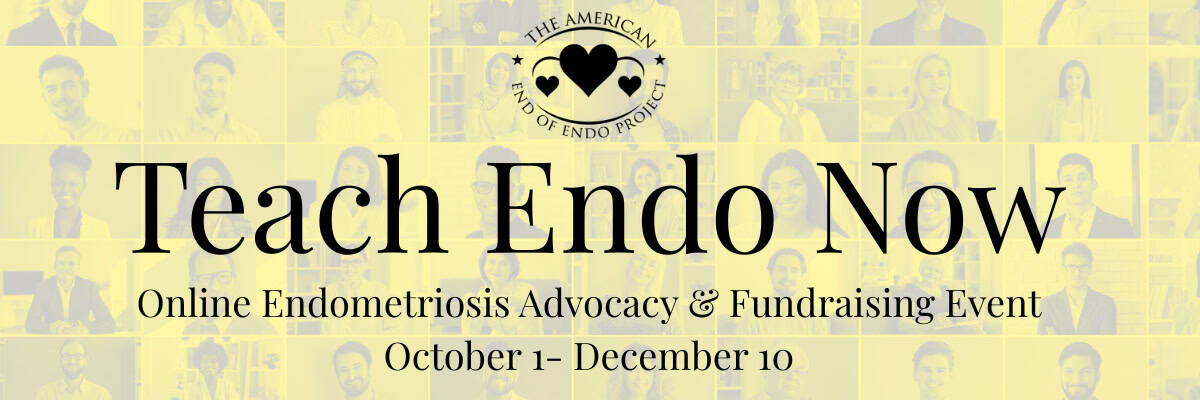
Teach Endo Now- 10 Types of People Who Need to Know About Endometriosis (How many can you identify in YOUR life?)
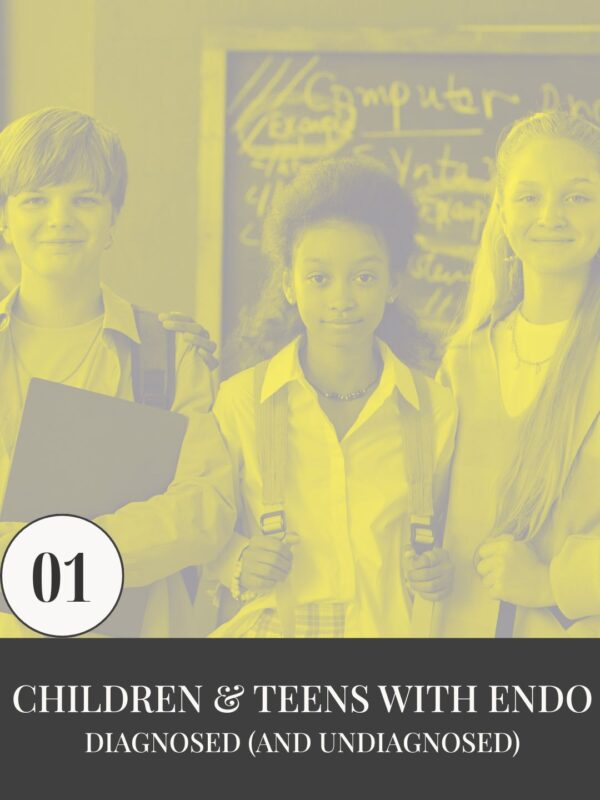
1) Patients (Children & Teens)
If you are a kid and have (or think you might have) endometriosis, here are some things we hope are helpful for you.
Most important for you to know: Endometriosis can feel different in different people. One of the main things young people notice though is that their periods might be extremely painful. If you have friends who also have periods but maybe theirs don’t seem to be as bad, you *may* want to talk to trusted adults and your doctor about endometriosis. If you have a relative who has endometriosis, you are even more likely to have it, too!
Periods are not comfortable, but they should not hurt so bad that medicines or a hot shower do not help. Sometimes, changing the foods we eat (like cutting ones that are thought to be more inflammatory and adding ones that support our health as a whole) can help with symptoms. Never forget, you have rights! No one can make you take medication or do a procedure you do not want. You also have the right to research what some good options may be for you. Always make all health choices under the guidance of a trusted medical professional.
Key Takeaways: If your period seems suspiciously painful, talk to a trusted medical professional about steps to take as a young person. One non-invasive measure could involve personalized changes to the foods you choose to consume. Everyone has differences in what best nourishes their bodies, so always make any changes under the guidance of your healthcare professional.
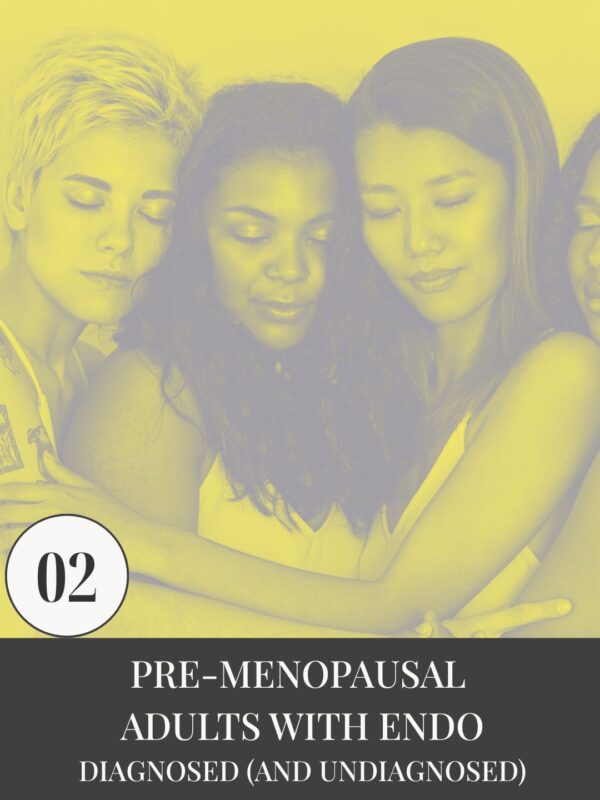
2) Patients (Young adults- Pre-Menopausal)
If you are an adult who has not yet reached menopause and you have endometriosis or think you might, this information is for you.
Most important for you to know: First of all, you are not weak or “just handling things poorly.” If you are in pain, have other crazy symptoms and/or are dealing with infertility, you have every right in the world to be disgruntled and eager for help. Too often we are not given the information or the tools we need, yet we are judged by the outside world for how it looks when we suffer. If you do not know a lot about endometriosis yet or suspect you have wrong or incomplete information, we encourage you to peruse our website for more information as well as trusted resources like the following:
Worldwide Endo March The Endometriosis Summit Endo Battery Podcast Extrapelvic Not Rare Vital Health Institute In 16 Years Podcast EFA/ Dr. David Redwine
If you have endometriosis (or think you might), we cannot make this clear enough: you need a legitimate endometriosis specialist. Anyone can call themselves that, so really interview them. Under whom did they train? How long have they dedicated their career to endometriosis? Are they published/do they present any research? Are they still trying to juggle this intense specialty field with obstetrics? Talk to other people who have had surgery with them and see what their pros and cons are. A great starting point is our directory
Find one who does excision with wide margins and who promotes a blend of allopathic and natural medicine. Research like crazy, do not take no for an answer, and fight for yourself.
Key Takeaways: There are a lot of ways to NOT get help with endometriosis, but if you research a lot, find an amazing endometriosis doctor, and never accept “no” as answer, you will give yourself a fighting chance at remission or decreased symptoms.
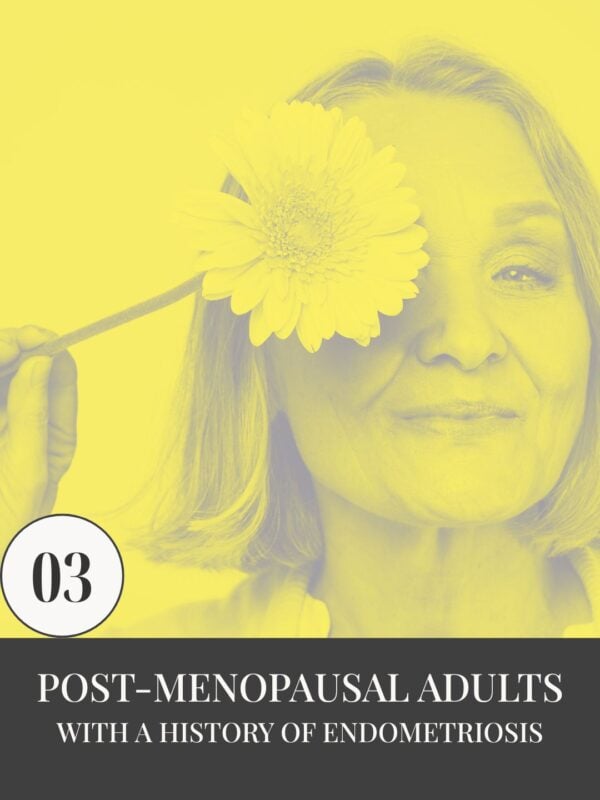
3) Patients (Post-Menopausal)
If you are a person who has endometriosis or “had” it, this information is for you.
Most important for you to know: Though many people with endometriosis look forward to menopause because they are told they will no longer have symptoms, that is not true for everyone. Endometriosis can cause scar tissue and adhesions that glue organs and tissues together. So, even if the endo lesions relax somewhat with the lack of hormones, many people still experience symptoms after menopause. Sometimes, post menopausal and/or post-hysterectomy patients continue to have issues like back pain, bladder pain, and gut issues that are due to unaddressed damage from endometriosis. (Yes, there can be other causes as well, it is just important to bring this up as a possible issue since it is rarely advertised.)
It is also important to remember that everyone’s stories are different. Just because endometriosis affected you one way and you found relief one way does not mean that is the case for everyone. Be kind to one another, because you never really know what they are going through.
Key Takeaways: You can still have pain and other symptoms even after menopause, menopause-inducing medications, and hysterectomies. Also, everyone’s story is different, so just listen and be kind to one another.
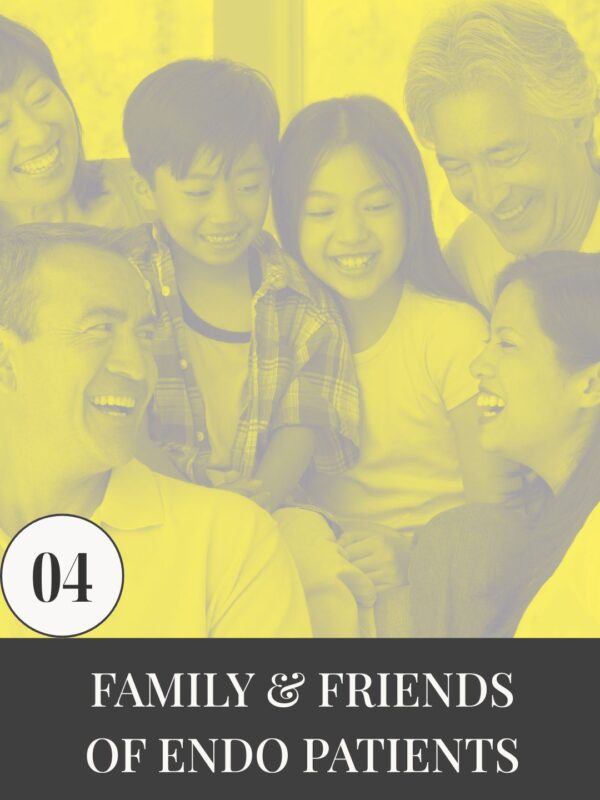
4) Family, Friends, & Family Friends of Endo Patients
If you are a mom, dad, sibling, niece, nephew, friend, family friend, or other close relation to a person who has (or may have) endometriosis, this information is for you (partners, you get a separate area)
Most important for you to know: If a family member or friend has endometriosis, first of all they just need you to believe them and show them compassion. It will never help to tell them to “buck up” or to tell them in any way that they are letting you down (believe me, they know). Endometriosis patients want to be there for you so badly. Never accuse them of “pretending to be sick” for any reason. In fact, patients who deal with chronic pain and illness are more often than not “pretending to be well.” When pain levels that would put most people in the ER are a frequent (even daily) occurrence, it’s devastating for a patient to miss out on important events, time with loved ones, etc. Never guilt them. Show love and compassion.
Learn about endometriosis as much as you can. (It means a LOT to us patients when you learn about our condition). Think of chronic-illness-friendly activities when your Endo Friend is flaring too much to go out but not enough to need aloneness (things that involve heating pads, blankets, and access to a bathroom, preferably…)
Key Takeaways: Learn all you can, COMPASSION ONLY, build your Loved One up, think of alternate activities
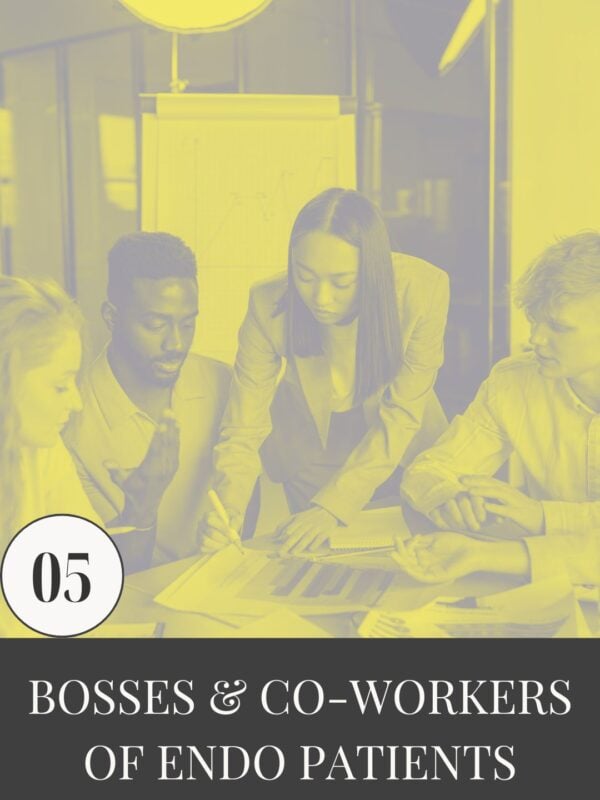
5) Bosses & Coworkers of Endo Patients
If you are a boss or co-worker of a person with endometriosis, this section is for you.
Most important for you to know: The person you work with who has endometriosis is doing everything they can to achieve, accomplish, and show up. If they cannot do that at any point, please show them grace. Many people with illnesses like endometriosis are unable to participate in the workforce at all to the tune of billions of dollars of lost productivity each year in the US. As this person seeks care and relief, understand that your compassion and grace goes a long way for them, their family, and society. If there are ways to adapt the job or schedule, please consider them. Some people need a heating pad at their desk and some people need to work from home occasionally, for instance. A person who has endometriosis is doing the best they can to pass as “normal” as often as they can while dealing with (often) daily pain that would put an otherwise healthy person in the ER. Learn all you can about the condition, know how important you are for making employment possible for a person with this condition, and see how you can adapt roles and share burdens wherever possible.
Key Takeaways: Learn all you can about endometriosis, have compassion and grace, think of ways to adapt to help the person with endometriosis
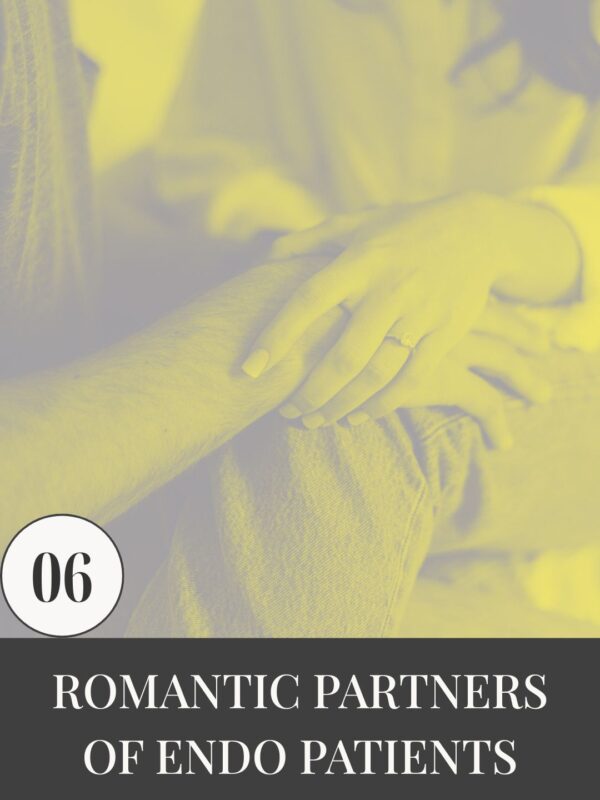
6) Partners of Endo Patients
If you are a romantic partner of a person who has endometriosis, this section is for you.
Most important for you to know: The person with endometriosis never wants to let you down, but they may often feel like they do. Chronic pain to that degree can sap out a person’s energy, and inflammation, gastrointestinal issues, bladder problems, pain, and bloating can make it difficult to fathom physical intimacy. Sometimes, sexual activities can hurt patients during and/or after. Your partner with endo does not want to be canceling plans or making you do more work. Your partner with endo might be afraid of possibly infertility or feel deep emotions with confirmed fertility issues or if she was given a hysterectomy. The emotions span so widely and so deeply with this condition and others like it because so much identity is wrapped up in many of the organs that endometriosis often affects.
Want to help? Research all you can about endometriosis and ask good questions. Don’t resent when plans must be canceled. If your partner is able, focus on “flare-friendly” activities instead. Be compassionate, gracious, and kind. Graciously encourage your partner as they go through painful, difficult treatments. Help them as much as you can during recoveries. NEVER accuse them of making it up or being weak. If you could experience what they go through, you would think very differently.
Key Takeaways: Love is compassionate, gracious, and not self-serving. Learn all you can, ask good questions, and be okay with plans changing.
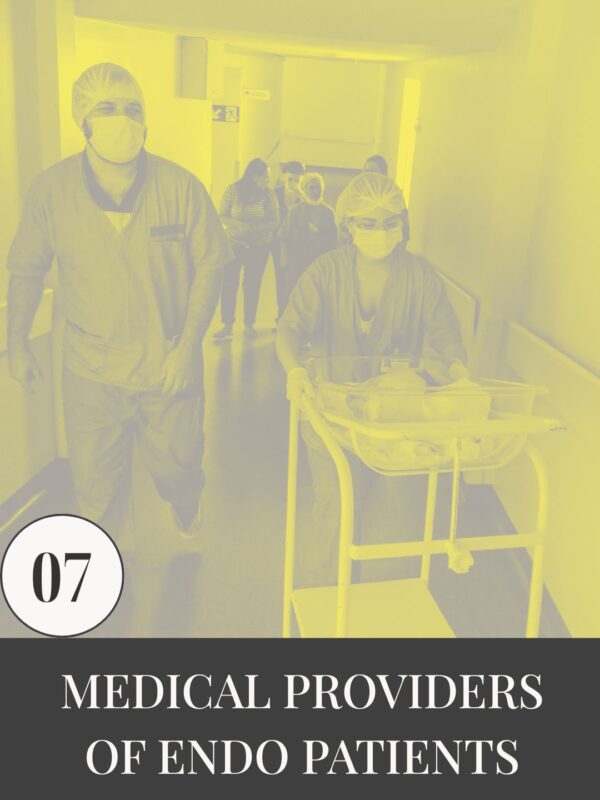
7) Medical Providers
If you are a doctor, nurse, or other medical provider who interacts with patients, this section is for you.
Most important for you to know: 1 in 7 people of the female sex are afflicted with endometriosis. It affects everyone differently, but many symptoms are common. We implore you to humble yourselves for a moment since we all know medical school did not spend much time on this and much of what they taught you was not up-to-date. That being said, here’s what you need to know: It hurts worse than you think it does. It does not come from retrograde menstruation. If you are not an extremely-well-trained endometriosis specialist who has devoted your life to endometriosis, please stop leading people to think you can handle the condition well. Make sure everyone knows ALL the possible side effects of hormonal medications (especially ones that shut down the production of them). Stop giving out hysterectomies for endometriosis. Stop saying “your labs look good and imaging looks good so thus you’re good…” Just refer the patient to an endo specialist and stop gaslighting them. Listen. Intently. Believe your patients and assume that they are in touch with their bodies. Learn all you can about endometriosis. Do NOT get that information from pharmaceutical companies. Learn from top doctors in the field. The more you listen intently to patients and learn earnestly from leading specialists, the more of an incredible difference you will make.
Key Takeaways: Humble yourselves and learn from top endo docs, stop peddling myths, make sure patients have truly informed consent, do not gaslight patients, do not give hysterectomies for endometriosis.
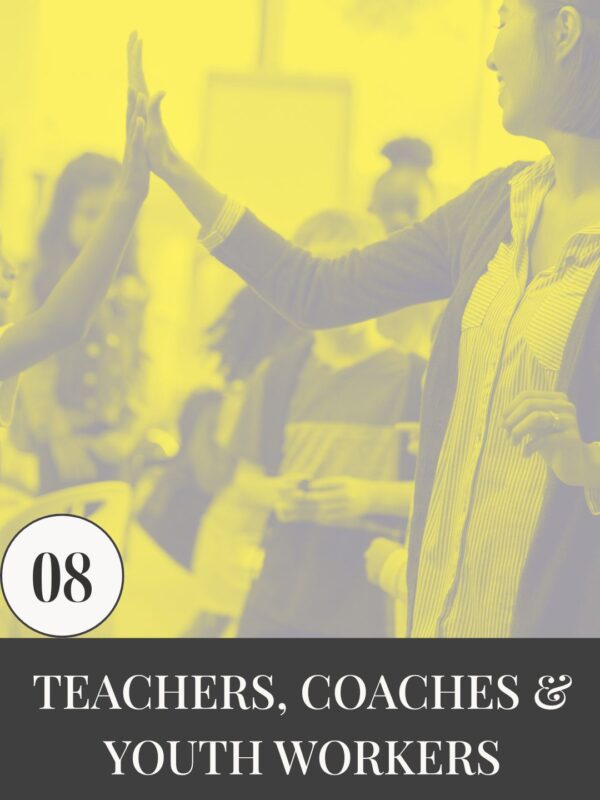
8) Teachers, Coaches, and Youth Workers
If you are a teacher, coach, school nurse, or some other non-family member who serves youth, this section is for you.
Most important for you to know: Endometriosis affects approximately 1 in 7 of the female sex. It may affect each person differently, but many of the main symptoms are common. Think of how many of your student population may be affected by this. As someone who sees these students regularly, it is crucially important that you learn all you can about endometriosis from trusted resources. If your students have particularly difficult menstruation and/or ovulation; if your student has unexplained issues including low back pain, pain that shoots down the legs, or gastrointestinal issues (among other things), give them grace. Be kind and do not humiliate them. Sometimes people with endometriosis and related conditions bleed more, so give them the breaks they need. Do NOT assume that they are making it up or trying to get out of something. The rest of the world will be inclined to gaslight them: do not join that crowd. Be their champion.
Key Takeaways: Many of your students may be dealing with the effects of endometriosis without even knowing it yet. Learn all you can about endometriosis from reputable sources, spread endometriosis awareness to students, their peers and their families, encourage anti-inflammatory, nutrient-dense eating and gentle movement, have grace if they need extra bathroom breaks or need to sit out from activities sometimes, and encourage them to seek good help. Help the taboo of speaking properly about such issues end with you and any staff who will come alongside you.
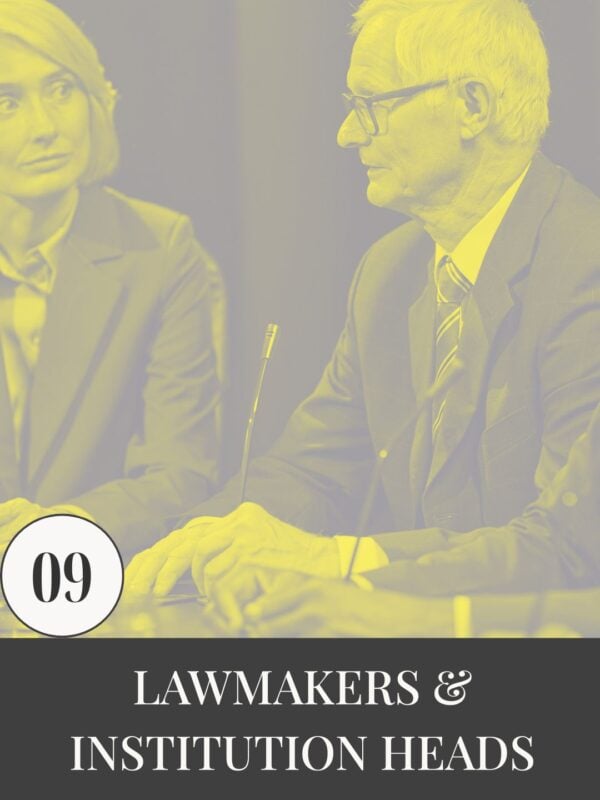
9) Lawmakers & Institution Heads
If you are a lawmaker at any level or if you are the head of a medical institution or related firm, here’s what you should know.
Most important for you to know: Millions of people have endometriosis. Their lives affect their family, friends, coworkers, and more. Each life is valuable and full of potential. As a person in your position who wants to make the world a better place, please understand the severity of this issue. It is not small and quiet, it is a volcano that has been dormant long enough. Earnestly seek out the best information you can and learn all about endometriosis. Refuse to turn a blind eye to evidence that goes against “how it’s always been done” or “how we were all taught.” Stop limiting patients to needing to be sustained on heaps of drugs when all we want is a true chance to heal, and that chance comes with expert excision with wide margins (NOT burning), pelvic physical therapy, anti-inflammatory diet, and sometimes other measures spanning a wide range of disciplines. Patients are tired of being lied to, tired of being given “the cheap and easy thing” to shut them up, and dependent on substances that can cause harm. Patients want dollars actually given to GOOD research. Patients want the correct definition of endometriosis to be used. Patients are tired of “Sampson’s theory of retrograde menstruation”: it has been disproven, let us move on. Prioritizing endometriosis research and gold-standard care will reduce suicidal behavior, improve the economy, improve the numbers of people who graduate at all levels, will put people back into the workforce, and will strengthen society.
Key Takeaways: Truly helping endometriosis patients instead of making or accepting excuses will have an enormous positive impact on society. Take the initiative to get to the bottom of things, stand up for the truth, and do not let financial incentives sway you. Be a leader of honor and be on the right side of history.
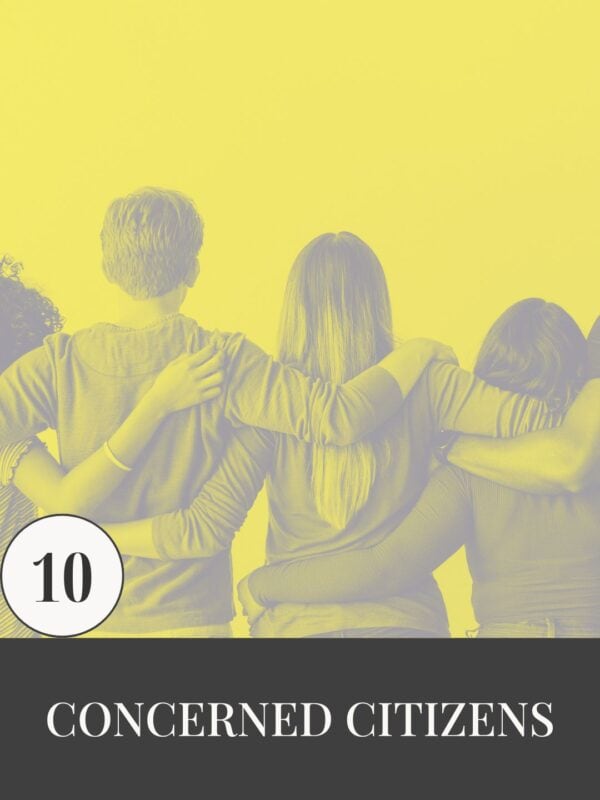
10) Acquaintances & Other interactions (the general public)
If you maybe did not fit well into one of the categories above, fear not. You are still a citizen of earth and there are some things you need to know:
Most important for you to know: Approximately 1 in 7 people of the female sex have endometriosis. Some know it already, some do not. Some people experience pain, some just infertility. There are LOTS of nasty symptoms people can experience, in fact.
With such a high prevalence, the likelihood of you meeting someone who has endo is really big. Learn all you can. Have compassion. Help spread awareness and raise funds for good endometriosis organizations like this one. We all need to stick together and fight the myths, ignorance and broken systems that keep endometriosis patients so sick.
Key Takeaways: You, too, have an important role. Everyone needs to know about endometriosis because it affects literally everything.

(Having fun and really wanting to do more? Here are some BONUS actions:
- Send this campaign to 10 other endometriosis social media accounts or influencers
- Ask 10 businesses to sponsor AEEP for 10, 100, or 100 dollars
- Take the survey HERE
This information is for educational purposes and is not intended to be used as medical advice. Talk to a healthcare professional before making any health decisions.